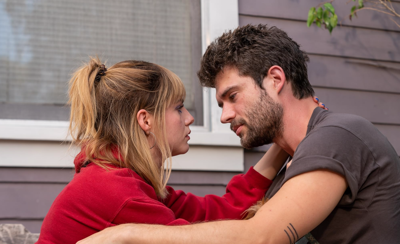After a limited week-long theater premiere in early April, “The Greatest Hits” makes it to streaming as a Hulu original. It tells a story of love, loss and, finally, moving on through an exploration of various songs that lead to revisiting the past — literally.
The film follows Harriet (Lucy Boynton) traveling to the past by listening to songs that bring her back to moments with her deceased boyfriend, Max (David Corenswet). Desperate to change the past she lost, Harriet searches for a record that could change the past. In her present, she meets David (Justin H. Min) in grief therapy. Harriet and David bond over their grief for loved ones and learn to move on.
Harriet cannot control her musical time travel, so she lives life wearing headphones unless a “safe song” is playing to avoid accidentally going to the past. The near-constant headphone wearing prompted her to gain the nickname “headphones”.
Director and writer Ned Benson depicts the past as brief bright glimpses into Harriet’s relationship with Max, whereas the present is duller to visualize Harriet’s grief. The past looks brighter as if putting on a lens of rose-colored glasses. There’s a glitch effect when Harriet is in the past and she can never stay long.
Benson perfectly visualizes how grief over loved ones can cloud the flaws of the relationship through desperation and delusion.
Harriet’s grief and need to get Max back hides the question of whether they were even right for each other in the first place.
“The Greatest Hits” fails to show why Max and Harriet may not have been compatible; instead, Harriet’s friend Morris (Austin Crute) reassures Harriet and tells her to focus on the present and to move on from Max. Morris tells her they didn’t get to figure out if they were really compatible.
Missing from the film’s plot is a focus on why audiences should be attached to Max. There’s not enough time to emphasize the tragedy of their relationship, which fails to evoke a feeling of a devastating loss. The audience can only sympathize for Harriet, but not feel the complete sadness and devastation of losing a loved one with her.
The film’s trailer brought in an expectation that Harriet would have to decide between Max and David. However, it reminds the audience that you cannot change what others do, only what you do.
Throughout the film, Harriet realizes what she must change in the past: never getting into a relationship with Max, which also means she never meets David. Before changing the past, she promises to David that she will look for him.
Corenswet’s role may be minimal in the film, but it allows the audience to see his role of Max through the cloud of Harriet’s grief. What’s shown is only an idea of Max, which is effective at showing how their relationship may have been mismatched.
The film’s plot, specifically of the past, is mostly limited to Harriet’s selective and subjective memories.
The soundtrack of the film includes songs by Nelly Furtado, Lana Del Rey, Phoebe Bridgers and others audiences might be familiar with. It includes a mix of uses between diegetic and non-diegetic music.
Encompassed in the film is how much music impacts memories and how much music is played in daily life. Music is heard at festivals, concerts, parties, at home, at work, in headphones and in the car — these places are all included in the film.
Harriet meets Max at a music festival, and then, in the end, she meets David at a concert.
“The Greatest Hits” at its heart is a romance film, as to love someone is to lose them. The message is that one has to move on from the past and find love in the present, instead of looking back in grief to truly move forward.
It may not be the greatest romance film ever produced, but its strength lies in its conceptualization. Its premise is surrounded by the idea that music has the power to take you back in nostalgia.
Overall, the film isn’t as memorable as it could be, but could be memorable in its uniqueness. What stands out is mainly the plot, not so much the performances from Boynton, Min and Corenswet.
It’s a representation, however, of what the depression of grief can do to anyone. Harriet had to quit her job to avoid hearing music that takes her back to her deceased boyfriend.
Audience members who enjoy time travel romance films, such as “The Time Traveller’s Wife” or “Somewhere in Time”, may enjoy “The Greatest Hits”. This film has a musical twist that other time travel romance films may not have through its usage of diegetic music as time travel triggers.



